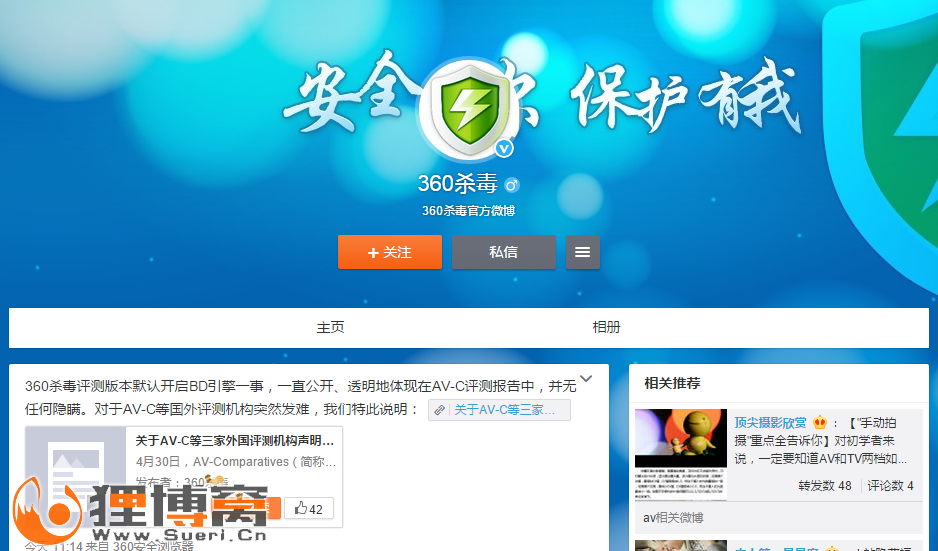共计 6949 个字符,预计需要花费 18 分钟才能阅读完成。
今天,三家世界上最知名和最权威的反病毒测试机构 AV-Comparatives、AV-TEST 和 Virus Bulletin 发布声明,称 360、百度、腾讯等中国厂商使用特殊版本参加测试,剥夺了 360 在 2015 年最新测试的奖项。
AV- C 在声明中表示,360 在评测版本中仅默认开启了 BD 引擎,并以此为理由剥夺了 360 在 2015 年的最新测试奖项。而 360 方面则认为,在测试的全部过程中,360 默认开启 BD 引擎的行为是公开透明的,并没有对评测机构隐瞒,因此对 AV- C 的发难感到疑惑和不解。
对于为何在普通用户版本中为何没有默认开启 BD 引擎,360 方面指出这是因为中国存在大量低配电脑,360 杀毒为保证用户的正常使用体验,为国内用户提供了较为轻巧的安装包。而用户完全可以根据自己的实际情况,在 360 杀毒主界面打开或关闭 BD 引擎。
此外,由于 AV- C 等评测机构的评测标准并不完全适用于中国国情。比如按照标准评测规则,破解器、外挂软件都会被定义为恶意软件,而此类软件在中国有大量用户在使用。实际上这些软件并没有侵害用户权益的恶意行为,因此安全软件不会对此类软件进行报警、查杀。
360 认为,正是因为诸如此类的问题,让中国安全软件的国内版本并不适合在国际赛场上参赛,因为这会造成评测结果与其真实实力之间的巨大差距,而这对国产安全厂商显然是不公平的。在这方面,AV-Test 的态度显得更为谨慎,正在对事件进行深入调查。而 AV- C 则略显武断,取消 360 所有奖项的做法也有失公允。
于此同时,在奇虎 360 被通报除名后又将腾讯和百度两家公司拉下了水。随后,对腾讯和百度的调查开始。据调查腾讯和百度,在评测版本中带有 AVC、AVTEST 和 VB100 这些测试机构的标志。
Testing bodies AV‐Comparatives, AV‐TEST and Virus Bulletin comment on
allegations of inappropriate behavior
Today, three of the world’s most renowned and trusted security testing bodies, AV‐Comparatives, AVTEST
and Virus Bulletin, stand united to censure security vendor Qihoo 360 after finding the firm
submitted products for comparative and certification testing which behaved significantly differently
from those made available to its users and customers. The three testing bodies will revoke all
certifications and rankings awarded to the company’s products so far this year, and going forward will
insist on more open and fair dealings to ensure users are provided with the most accurate information
possible.
Investigations by the three labs found that all products submitted for testing by Qihoo had one of the
product’s four available engines, provided by Bitdefender, enabled by default, while a second, Qihoo’s
own QVM engine, was never enabled. This included versions posted to ostensibly public sections of the
company’s websites.
By contrast, as far as can be determined, all versions made generally available to users in Qihoo’s main
market regions had the Bitdefender engine disabled and the QVM engine active. According to all test
data this would provide a considerably lower level of protection and a higher likelihood of false
positives. Options are provided in the product to adjust these settings, but as the majority of users leave
settings unchanged, most tests insist on using the default product settings to best represent real‐world
usage.
As part of the investigation into Qihoo 360, counter‐accusations were levelled by the company against
two fellow Chinese security firms, Baidu and Tencent. Analysis of products submitted for testing by
these companies turned up some unexpected flags within their products, marked with the names of
several test labs and implying some difference in product behavior depending on the environment they
were run in – similar flags were also found in Qihoo products. However, no evidence could be found that
this gave any significant advantage to either product, and in some cases it even seemed to put them at a
disadvantage. Both firms were able to provide good reasons for including these flags in their products.
On requesting an explanation from Qihoo 360 for their actions, the firm confirmed that some settings
had been adjusted for testing, including enabling detection of types of files such as keygens and cracked
software, and directing cloud lookups to servers located closer to the test labs. After several requests for
specific information on the use of third‐party engines, it was eventually confirmed that the engine
configuration submitted for testing differed from that available by default to users.
Qihoo’s awards and certifications attained since the start of 2015 will thus be stricken from the records
by all three testing bodies, and all three will be imposing stricter demands on test participants to avoid
any further gaming of results by vendors.
“This sort of thing doesn’t really help anyone,”said John Hawes, Chief of Operations at Virus Bulletin
[editorial@virusbtn.com].“Independent tests serve both users and developers, showing which products
are performing best and highlighting areas where developers need to work harder. If the products being
tested aren’t those being used in the real world, nobody’s getting any useful information.”
Andreas Clementi, CEO of AV‐Comparatives [media@av‐comparatives.org], said:“Independent antimalware
testing plays a key role in raising the standard of protection on users’devices, which in turn
makes the Internet a safer place for everybody. Misuse of such tests for marketing purposes will, in the
long run, result in more successful malware attacks, making Internet users less secure.”
Maik Morgenstern, CEO of AV‐TEST [presse@av‐test.de], said:“Comparative testing and certification
plays an important role in the anti‐malware industry, both for the users and the vendors. Users rely on
independent results to make an educated decision regarding their protection software. If vendors start
to manipulate the testing process, they are hurting everyone involved.”
About AV‐Comparatives
AV‐Comparatives [av‐comparatives.org] is an independent organization offering systematic testing that
checks whether security software, such as PC/Mac‐based anti‐virus products and mobile security
solutions, lives up to its promises. Using one of the largest sample collections worldwide, it creates a
real‐world environment for truly accurate testing. AV‐Comparatives offers freely accessible results to
individuals, news organizations and scientific institutions. Certification by AV‐Comparatives provides an
official seal of approval for software performance which is globally recognized. Currently, AVComparatives’
Real‐World Protection Test is the most comprehensive and complex test available when it
comes to evaluating the real‐life protection capabilities of anti‐virus software. Put simply, the test
framework replicates the scenario of an everyday user in an everyday online environment – the typical
situation that most of us experience when using a computer with an Internet connection. AVComparatives
works closely with several academic institutions, especially the University of Innsbruck’s
Department of Computer Science, to provide innovative scientific testing methods.
About AV‐TEST
AV‐TEST [av‐test.org] GmbH is an independent supplier of services in the fields of IT security and antivirus
research, focusing on the detection and analysis of the latest malicious software and its use in
comprehensive comparative testing of security products. Due to the timeliness of the testing data,
malware can instantly be analyzed and categorized, trends within virus development can be detected
early, and IT‐security solutions can be tested and certified. The AV‐TEST Institute’s results provide an
exclusive basis of information, helping vendors to optimize their products, special interest magazines to
publish research data, and end‐users to make good product choices. AV‐TEST has operated out of
Magdeburg (Germany) since 2004 and employs more than 30 team members, professionals with
extensive practical experience. The AV‐TEST laboratories include 300 client and server systems, where
more than 1,000 terabytes of independently collected test data, containing both malicious and harmless
sample information, are stored and processed.
About Virus Bulletin
Virus Bulletin [virusbtn.com] is an online security information portal and certification body providing
users with independent intelligence about the latest developments in the threat landscape, as well as
conducting bimonthly certifications of anti‐malware and anti‐spam products. Both its VB100 antimalware
tests and VBSpam spam filter tests are well recognised and highly respected in their fields.
Virus Bulletin also organises the VB Conference, an annual event at which the brains of IT security from
around the world gather to learn, debate, pass on their knowledge and move the industry forward – the
25th Virus Bulletin Conference will take place in Prague 30 September to 2 October 2015. Virus Bulletin is
supported by an Advisory Board comprising some of the world’s leading anti‐threat experts.



 剩下的1个百度1个金山 2个海外杀软
剩下的1个百度1个金山 2个海外杀软 太可怕了。。装QQ管家的都是为了升级=A=
太可怕了。。装QQ管家的都是为了升级=A= 依旧360 目前来说最好用。。
依旧360 目前来说最好用。。






